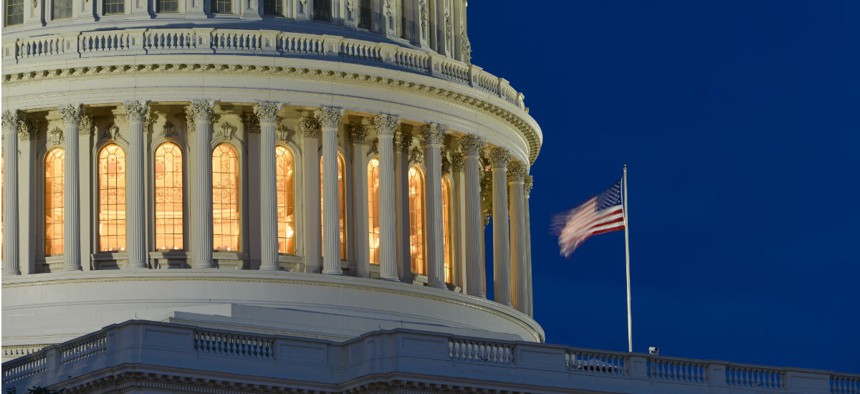
House Passes Shutdown-Averting Measure, Senate Plans Still in Flux
Senate leaders working on a deal to raise spending caps.
The House on Tuesday approved a measure to fund most of the government on a continuing resolution for six weeks while providing full year appropriations to the Defense Department, despite warnings from congressional Democrats the bill will not make it out of the Senate without significant changes.
The measure would mark the fifth continuing resolution to come out of Congress in fiscal 2018. The current measure, which keeps agencies funded through Thursday, was agreed to after lawmakers allowed appropriations to expire last month and agencies were forced to shut down for three days. Lawmakers have yet to agree on any of the outstanding issues that led to that impasse, and Democrats are insisting the latest push to buy more time is dead on arrival.
The bill would fund all non-defense agencies through March 23 at fiscal 2017 levels. The Pentagon would receive $700 billion through Sept. 30, the end of the fiscal year. Democrats have rejected the so-called CRomnibus (CR-plus-omnibus), insisting that spending caps established by the 2011 Budget Control Act be raised for defense and non-defense agencies equally and in concert. Despite those concerns, the House passed the measure Tuesday evening with little Democratic support.
Rep. Rodney Frelinghuysen, R-N.J., the House Appropriations Committee chairman and author of the latest CR, said the bill was necessary to “ensure the programs and services that all Americans rely on are maintained and available to all.” More time, he added, will enable lawmakers to strike a longer term spending agreement.
“It is absolutely vital that all 12 of the regular appropriations bills be negotiated and signed into law,” Frelinghuysen said. “This CR will allow for additional time for a deal to be reached on topline spending levels for this fiscal year. Once this agreement is made, my committee will rapidly go to work with the Senate to complete the final legislation.”
Senate Minority Leader Chuck Schumer, D-N.Y., said Tuesday morning he and Senate Majority Leader Mitch McConnell, R-Ky., still have some issues to resolve on a larger spending agreement but they are closer to such a deal “than we have ever been.” Schumer said that House Republicans, however, were pushing a plan they knew would fail, as a House-backed bill would still require 60 votes in the Senate.
“House Republicans continue marching down a very partisan road, proposing a CRomnibus that will raise defense spending but leave everything else behind,” Schumer said, “and as I have said many times before, a CRomnibus will not pass the Senate. Speaker [Paul] Ryan and House Republicans keep running into the same brick wall.”
McConnell on Tuesday agreed that “bipartisan talks are continuing to progress toward an agreement on spending caps and important priorities all of us are eager to address.” He added that Congress should approve the CRomnibus to allow those talks to continue and to remove budget uncertainty for the military.
Schumer argued that funding increases for defense and non-defense should not be considered mutually exclusive. Congress has twice in recent years agreed to two-year budget deals that lifted spending caps for both domestic and defense spending.
“We don't want to do just one and leave the other behind,” Schumer said. “The sequester caps have arbitrarily imposed austerity on both sides of the ledger.”
Schumer and McConnell appeared to make progress toward a budget cap deal after meeting on Tuesday, with leaders in both parties suggesting an agreement was imminent.
“I'm optimistic that very soon we'll be able to reach an agreement,” McConnell said after the meeting. The Senate would likely attach the spending deal, which would boost defense caps by $80 billion and non-defense caps by $63 billion for fiscal years 2018 and 2019, to the CR before sending it back to the House.
House Speaker Ryan, R-Wis., said on Tuesday that Democrats were holding up a budget deal because they were focusing on other issues, such as a resolution for immigrants whose protective status on the Deferred Action for Childhood Arrivals program will soon expire.
“The only reason we do not have a full budget agreement is because Democrats continue to hold funding for our government hostage over an unrelated issue,” Ryan said. Asked whether non-defense agencies should also see a spending boost, the speaker again blamed Democrats for not allowing such a deal to move forward: “We have been trying to get a budget cap agreement for six months.”
House Minority Leader Nancy Pelosi, D-Calif., deflected blame back toward Ryan, accusing the majority party of “incompetence.”
“Republicans must stop governing from manufactured crisis to crisis, and work with Democrats to pass the many urgent, long overdue priorities of the American people,” Pelosi said.
House Majority Leader Kevin McCarthy, R-Calif., did not rule out the possibility that agencies will again be forced to close their doors.
“Unfortunately, last time we had to have a shutdown,” McCarthy said. “Hopefully we will not be in that situation again.”
President Trump reignited shutdown fears Tuesday afternoon, saying at a White House event he would support forcing agencies to shutter if “loopholes” in immigration laws that he said were responsible for allowing criminals to enter the country were not closed.
“If we don't change it, let's have a shutdown,” Trump said at the White House event. “We'll do a shutdown. And it's worth it for our country. I'd love to see a shutdown if we don't get this stuff taken care of.”
Sign up for GovExec newsletters and alerts and download our app to stay informed.







